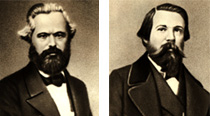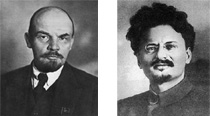The article below may be copied and circulated but proper attribution of authorship is required.
In Greenspan we trust
By F. Kreisel, January 23, 1998.
Paul Krugman, the well known MIT economist presented a lecture today on the subject of the "New Economy". Krugman is best known for mathematical modeling of economic factors, for inventing new measurement tools and units, for econometrics rather than economics. The term "the new economy" has been used in contemporary business literature to "explain" why the American economy has been expanding since 1984 without excessive inflation, and first and foremost, why it can go on expanding forever. By "expansion" the bourgeois professors refer to the increasingly frenzied finacial speculation and skyrocketing Wall Street share prices, not to any increase in actual production or, heaven forbid, rising living standards of the working class.
Krugman occupies the niche of a "skeptic" or a "pessimist" in the narrow consensus driven milieux of what passes for economic analysis today. He critiqued the view of the "optimists" who insist that with the collapse of "communism" the old limits of supply and demand are gone and the "new information-based economy" can go on expanding forever. This rosy view is basically the result of wishful thinking of the Wall Street speculators and the ideologues of the Republican Party who try to convince the middle class investors that the 20% yearly rises of the Dow Jones and NASDAQ averages can last forever, that these middle class investors should borrow even more so as to invest in the stockmarket, that all the newly invented forms of quasi-money and quasi-debt, like derivatives, bonds, etc., will go on rising like hot air forever.
Krugman, playing the role of a "skeptical realist", asserts that since historically (in the last 10 years) the American economy has been expanding at 2% per year this is how it will be in the future. Since the measured unemployment rate has been driven below 5%, this is the best that the American economy can achieve. The learned economist studiously ignored any analysis of the developments of the world economy, the integration of production internationally, the integration of labor markets, the collapse of industry in the former Soviet Union.
Professor Krugman was unable to exclude from his talk all references to the breathtaking collapse of the Asian tiger economies, but he attempted to minimize their import, asserting that this spectacular freefall of Korea, Thailand, Indonesia, and so on will have negligible effect on the United States.
This speaker asked Krugman whether the collapse of the Asian economies — which had followed the debt-driven expansionist prescriptions of bourgeois economists — portended a collapse of the US economy. After all, Thailand and Indonesia only executed what the IMF and the World Bank prescribe as the sure way to develop and grow. Their capitalists paid pittance wages to their workers, plowed profits back into expanding their export oriented businesses, borrowed ever more money to finance further expansion, and so on. This is what American capitalists want to do and the direction in which they are going.
To this the learned professor could only reply that "in Greenspan he trusts", that is, he believes (and fervently hopes) that Alan Greenspan, the head of the Federal Reserve Bank, will be able to juggle the pieces of the increasingly fragile and unsteady American economy in the air and somehow prevent this house of cards from crashing down.
We find that even the most learned and famous bourgeois economists begin to resemble medieval priests and witch doctors, as they try, with incomprehensible mumbo jumbo and loud incantations, to prolong the speculative frenzy of Wall Street.




